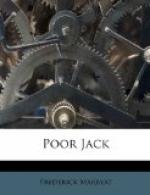And as she twisted up her hair, my mother burst out screaming:
“Little Bopeep,
she lost her sheep.
And couldn’t tell
where to find him;
She found him, indeed,
but it made her heart bleed,
For he left his tail
behind him.”
“Why, then, doctor, it was all sham,” exclaimed I.
“Yes; and the doctor’s come on a fool’s errand—
“’Goosey,
Goosey Gander,
Whither dost thou wander?
Upstairs and downstairs,
And in a lady’s
chamber.’”
The doctor shrugged up his shoulders so that his head disappeared between them. At last he said, “Your mother don’t want me, Jack, that’s very clear. Good-morning, Mrs. Saunders.”
“A very good-morning to you, Dr. Tadpole,” replied my mother with a profound courtesy; “you’ll oblige me by quitting this room and shutting the door after you, if you please.” As the doctor and I went down, my mother continued the song—
“And then I met
a little man,
Couldn’t say his
prayers,
I took him by the left
leg
And sent him downstairs.”
As soon as we were in the parlor, I acquainted the doctor with what had happened. “I’m sure I thought she was dead,” said I, when I had finished the story.
“Jack, when I asked you where your mother was bad, external or internal, you replied both, and a great deal more besides. So she is—internally, externally, and infernally bad,” said the doctor, laughing. “And so she amputated your father’s pigtail, did she, the Delilah? Pity one could not amputate her head, it would make a good woman of her. Good-by, Jack; I must go and look after Tom, he’s swallowed a whole yard of stick-liquorice by this time.”
Soon afterward Ben the Whaler came in to inquire after my father, and I told him what had occurred. He was very indignant at my mother’s conduct, and, as soon as the affair was known, so were all the tenants of Fisher’s Alley. When my mother went out, or had words with any of her neighbors, the retort was invariably, “Who sent the press-gang after her own husband?” or “Who cut off the tail from her husband’s back? Wasn’t that a genteel trick?” All this worried my mother, and she became very morose and ill-tempered. I believe she would have left the alley if she had not taken a long lease of the house. She had now imbibed a decided hatred for me, which she never failed to show upon every occasion, for she knew that it was I who had roused my father, and prevented her escape from his wrath. The consequence was that I was seldom at home, except to sleep. I sauntered to the beach, ran into the water, sometimes rowed in the wherries, at others hauling them in and holding them steady for the passengers to land. I was beginning to be useful to the watermen, and was very often rewarded with a piece of bread and cheese, or a drink of beer out of their pots. The first year after my father’s visit I was seldom given a meal, and continually beaten—indeed, sometimes cruelly so—but as I grew stronger, I rebelled and fought, and with such success that, although I was hated more, I was punished less.




